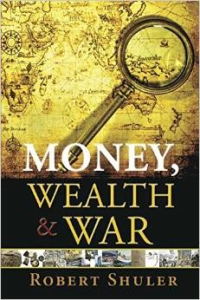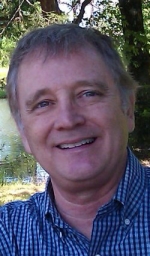Title: Money, Wealth & War
Author: Robert Shuler
Publisher: Robert Shuler
ISBN: 978-0-9911130-4-0
Pages: 300
Genre: Non-fiction, Business
Author Interview for Robert Shuler – Title: Money, Wealth & War
______________________________________________________________________
About the Author
Robert combines 50 years investing experience with the knack for finding hidden principles of a successful rocket scientist with half a dozen patents and several dozen publications in fields ranging from economics (corporate risk compensation, the equity premium) to physics (inertia & quantum gravity). He lives in Texas with his wife Natasha.
You can contact me or get new release notices at http://shulerresearch.wordpress.com/
Today we are talking to Robert Shuler, author of “Money, Wealth & War”.
PBR: What one piece of advice would you give to a new investor?
Plan to leave your children in a higher wealth bracket than you are in, and train them early in investing. I know this is not what people want. Lottery tickets sell like crazy, and stocks sell like lottery tickets. There are some things you can to accelerate your wealth building if after you have been doing it a while you find you are good at it. But the generational wealth building plan made Britain, France and Germany the richest countries in the world, and the U.S. by extension of those cultures of having small families and advancing at each generation. I am astounded by the popular notion that everyone is or should be even at birth. That leads people to squander resources and civilization decays, because they are not worried about providing for the future. It is an unexpected effect of what seems like a reasonable notion.
PBR: Did a particular event or conversation inspire this book?
I stumbled into a relation between trade, wealth and war while writing The Equity Premium Puzzle. But that is an esoteric economics book that I didn’t think would be widely read. So I had to write another book. I started looking for confirmation of my theory in history, which produced most of the middle section. After a break of a few months, I looked for confirmation among the backgrounds of the very wealthy, and compiled what I had learned about investing for the third and final part.
PBR: Which wealthy individual, past or present, would you like to meet with and discuss your book?
Henry Ford. He confronted the issue of money and productivity head on. What gave him the courage to double the salary of his entire workforce over a weekend? He also successfully practiced generational wealth building. I think I could learn a lot from him in one conversation. A close second would be Thomas Edison. No one alive today has a clue, but sometimes George Soros is insightful and interesting.
PBR: Is a follow-up to this book in the works?
I’d like to apply crash rate theory to social issues and global stability, and to address conflicts of religion. But don’t hold your breath because I haven’t figured out how to do this without alienating one group or another right off the bat. I have some physics papers pending that, if accepted, would provide a basis for explaining gravity to a wide audience without getting tangled up in differential geometry. When I retire, I’d like to try writing novels.
PBR: Who is your greatest writing influence?
Carl Jung. A close second is Sigmund Freud. The first books I tried to write in the early 90s were related to their themes. It isn’t my area of expertise, but maybe I’ll find a way to approach those ideas someday. Jung’s own story of feeling compelled to write resonated with me, because I had all these observations about life and felt blocked and Jung made it okay to feel compelled and to follow ones instinct, even if other people didn’t think it was productive. Jung was not a very accessible writer, but Freud was. Almost anyone can read Freud and find him entertaining.
PBR: How did you decide to become a writer?
I decided to become a writer in the late 1970s when reading a lot of science fiction. At that time I was influenced by Asimov and Heinlein and van Vogt and a few others. I tried short stories and was not immediately successful and didn’t have the time to pursue it. Later when I studied Jung and Freud I got a better idea about the story part of the story. More recently I’ve been influenced by Burroughs and by Otis Adelbert Klein. It’s really old stuff. But you find it is the basis of much that has come since. What are we? Do we just live and vanish? I always wished my mother had written her story for me to have and keep. Writing and reading, both fiction and non-fiction, liberate us from the compelled instinctive responses of only the present stimuli, and allow us to consider the past and future, and become something new and different. If you look at human history, it was going in one direction, toward more and more superstition, and almost to the day that writing was invented, things turned in another direction. Not everything has been good, and we have not always learned from the past, but there was a change. I feel there will soon be another change. We are on a cusp. I can’t tell you what it is, but we have all these new technologies and people are not really becoming deeper, to handle them. There is going to be something new.
To learn more about “Money, Wealth & War” please read the review at: Pacific Book Review




Follow Us